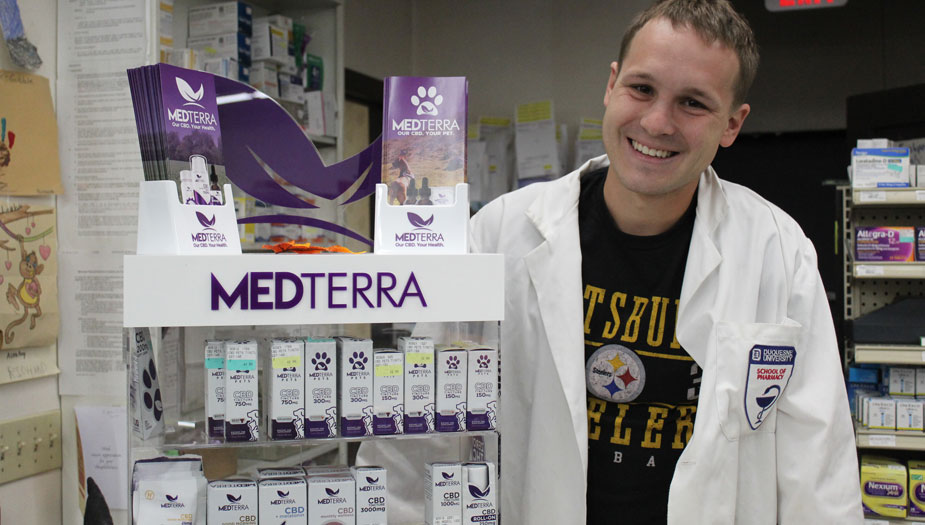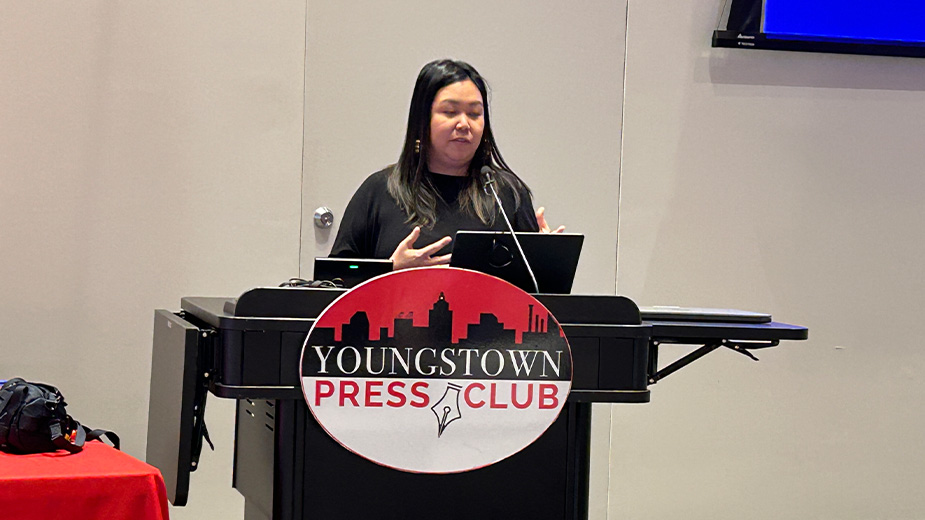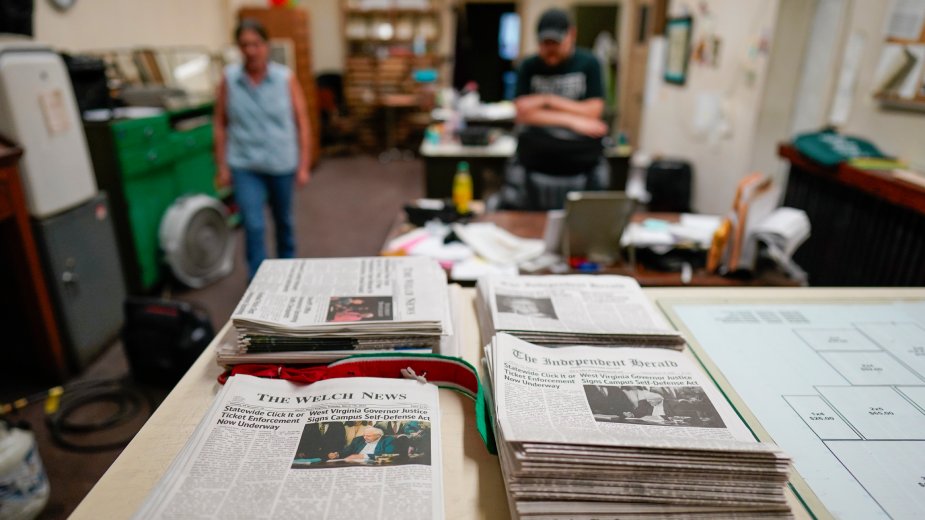Local Stores Tap into CBD Boom
YOUNGSTOWN, Ohio – Early this year, customers at Brown’s Drug Store in Boardman began asking about a new product they’d been hearing about: cannabidiol. The product wasn’t yet legal in Ohio, but they had heard about its properties that made it sound like a cure-all.
Then, on July 30, Gov. Mike DeWine signed a bill legalizing the cultivation and processing of hemp. Shortly after, the drugstore on Southern Boulevard got approval from the state Board of Pharmacy to stock cannabidiol – better known as CBD – and products infused with the compound.
A week later, the first CBD oils were on the shelves.
“It’s something people have been reading about coming down the pipeline and now that it’s here, we’ve seen a very positive response,” says Richard Pipak, pharmacist and co-owner of Brown’s. “A lot of people are coming in, asking questions, taking material home to read about it themselves and coming back to purchase it.”
CBD is a naturally occurring compound in hemp plants, a botanical cousin to marijuana. Unlike that plant, however, hemp has far lower levels of THC, the psychoactive ingredient in marijuana, but higher levels of CBD, which bring with it the plant’s medicinal properties.
Among the human body’s chemical processes is the endocannabinoid system, which plays a role in a wide range of functions, including stress, metabolism, anxiety, appetite, the immune system, sleep and the nervous system. Introducing CBD – whether in oils, lotions, edibles or vapors – supplements the body’s natural system.
“CBD is one-size-fits-all in its applications. What it does for everybody is going to be unique and specific per person. It won’t do everything for everybody, but it can do a lot,” says Christopher Treff of Tri-Healthy Co., which opened a CBD shop in Eastwood Mall in mid-September. “There’s CBD in our body from the day we’re born. Adding an organic source of that CBD works toward homeostasis.”
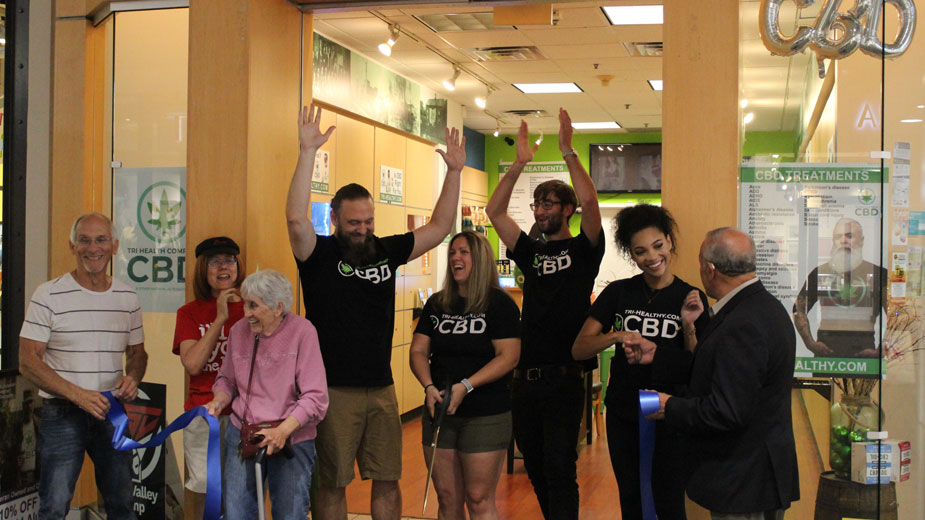
All employees at the store, says co-owner Paul Kaldy, have used CBD products. Personally, he says, he’s used gummies and oils to help with sleep problems and manage anxiety. Tri-Healthy also operates stores in Johnson City, Tenn., and a kiosk at the Southern Park Mall in Boardman, which he aims to replace with a storefront by November.
“I’ve got stores 400 miles apart,” he said with a laugh at the Eastwood store’s grand opening Oct. 3. “If anyone has anxiety, it’s me.”
With all employees using CBD products – oils are the most popular, followed by topicals and edibles, such as brownies and fudge – customers can get recommendations for what products will best help them.
“We started as a customer. Whenever you’re able to start a business in something you believe in, the business process is easy,” Kaldy says. “For us, our staff all use CBD, so we’re able to relate to customers. We have our own experiences.”
Still, those recommendations are no substitute for professional medical advice.
“I’m not a medical professional so I refer people to their doctor with any of those questions,” says Lauren Whiteside, manager of Pacific Wellness Skincare & CBD on Market Street in Boardman. “I’m just here to recommend stuff based on personal knowledge.”
The store opened in April, before CBD was legalized in Ohio, as a place for those interested to learn about the products, Whiteside says. After DeWine signed Senate Bill 57, Pacific Wellness added its retail component.
“I have products ranging from $10 up to $200. You can get something to experiment with at a budget-friendly price,” she says, with products including vape cartridges and CBD-infused coffee. “It’s picking up a little bit more every day. This is a growing industry.”
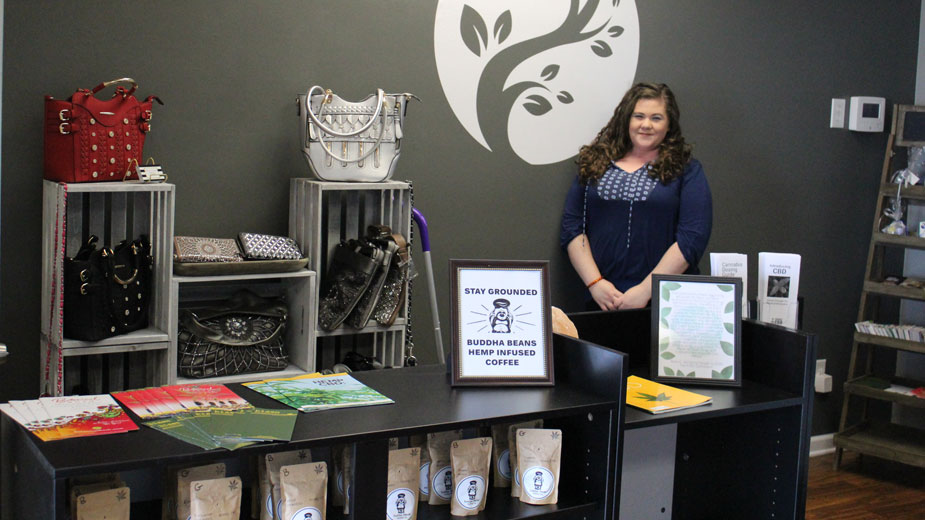
The growth has come in the past year, spurred by President Donald Trump’s signing Dec. 20 of the Agriculture Improvement Act. The new law did away with inclusion of hemp in the definition of marijuana on the Drug Enforcement Administration’s list of controlled substances. It also allowed for the movement of hemp and hemp-derived products across state lines, as long as it was produced at licensed farms. By law, CBD products must contain less than 0.3% THC.
Earlier this year, a cannabis-focused market-research firm, Brightfield Group, estimated the hemp-based CBD market would grow to $22 billion by 2022, up from just $327 million in 2017. The products are most popular, according to Consumer Reports, with people between 18 and 29. In a nationally representative survey, 40% of those in that age range say they’ve used CBD products.
The Food and Drug Administration is still working through researching the effects and effectiveness of CBD. Current efforts, the agency says, are focused on the long-term effects, cumulative effects from using multiple CBD products and safety for pets and special populations such as pregnant women, children and the elderly.
The FDA has approved only one prescription drug with CBD as an active ingredient, used to treat a rare form of epilepsy. In its review of that drug, Epidiolex, the agency identified safety risks, including potential liver injury, although those effects can be managed when the prescription is taken with medical supervision.
“But it is less clear how these risks might be managed when CBD is used far more widely, without medical supervision and not in accordance with FDA labeling,” the agency said in mid-July.
In addition, the World Health Organization has reported, “In humans, CBD exhibits no effects indicative of any abuse or dependence potential. … To date, there is no evidence of public health related problems associated with the use of pure CBD.”
To be on the safe side, medical professionals recommend that CBD users consult with their doctors and pharmacists before using products. All CBD products sold through pharmacies need to be tested by third parties.
“Usually, CBD gets along well with medications, although there are some where that’s not the case,” says Mary Jo Kalasky, pharmacist at Pharmacy Care. “That’s why we like people to get it here. We have the knowledge base to help them accordingly.”
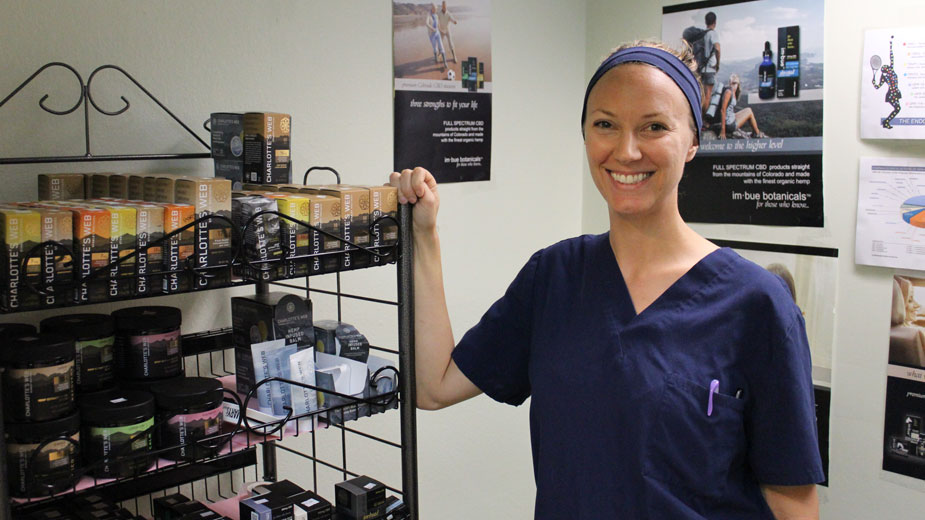
The store in downtown Canfield started offering CBD products 16 months ago, she says. Last year, the state pharmacy board issued regulations that the products could only be sold in marijuana dispensaries. At the time, Pharmacy Care pulled the items from its shelves, but added them after the products became legal statewide.
“Since it was a newer thing, there wasn’t much legislation on it and for a time, they did make us pull it from shelves for a couple months until things were finalized,” Kalasky says. “A couple of patients we knew had chronic conditions that I thought could benefit from the CBD. We started having more patients with similar conditions; so we offered it and it got great feedback.”
Since the product has only been sold in Ohio in retail outlets – chains such as GetGo, Circle K and Family Video also offer CBD – for about two months, some of the business is likely because of it being the hot new medical treatment, says Pipak of Brown’s Drug Store.
Whether it has staying power is to be seen.
“It’s good medicine. I don’t know that it’s the cure-all people are looking for or if it’s for everybody, but personally I think there are people out there that this can be very beneficial for,” Pipak says.
And, specifically as a pharmacy, carrying new medical products is a crucial component of his business.
“We have to have the products that bring people in. If there’s a new drug available, we want it here the next day,” Pipak says. “The point of health care is to make people feel the best they can. If something like CBD is the best option for that, it’s important to have it in a pharmacy.”
Pictured: Brown’s Drug Store has received questions about CBD for months, says pharmacist Richard Pipak.
Copyright 2024 The Business Journal, Youngstown, Ohio.
